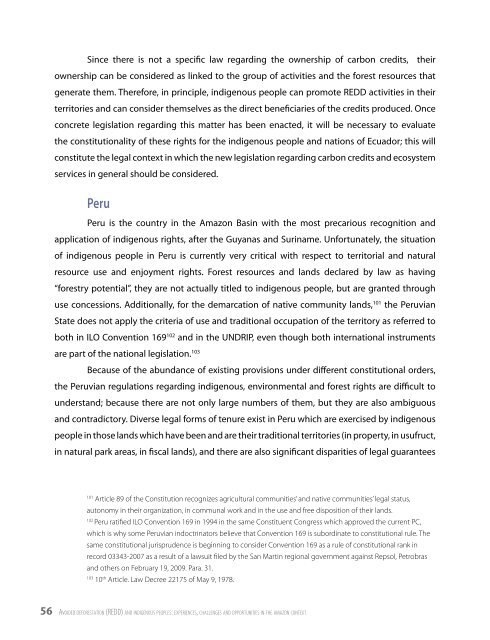Avoided Deforestation (REDD) and Indigenous ... - Amazon Fund
Avoided Deforestation (REDD) and Indigenous ... - Amazon Fund
Avoided Deforestation (REDD) and Indigenous ... - Amazon Fund
You also want an ePaper? Increase the reach of your titles
YUMPU automatically turns print PDFs into web optimized ePapers that Google loves.
Since there is not a specific law regarding the ownership of carbon credits, their<br />
ownership can be considered as linked to the group of activities <strong>and</strong> the forest resources that<br />
generate them. Therefore, in principle, indigenous people can promote <strong>REDD</strong> activities in their<br />
territories <strong>and</strong> can consider themselves as the direct beneficiaries of the credits produced. Once<br />
concrete legislation regarding this matter has been enacted, it will be necessary to evaluate<br />
the constitutionality of these rights for the indigenous people <strong>and</strong> nations of Ecuador; this will<br />
constitute the legal context in which the new legislation regarding carbon credits <strong>and</strong> ecosystem<br />
services in general should be considered.<br />
Peru<br />
Peru is the country in the <strong>Amazon</strong> Basin with the most precarious recognition <strong>and</strong><br />
application of indigenous rights, after the Guyanas <strong>and</strong> Suriname. Unfortunately, the situation<br />
of indigenous people in Peru is currently very critical with respect to territorial <strong>and</strong> natural<br />
resource use <strong>and</strong> enjoyment rights. Forest resources <strong>and</strong> l<strong>and</strong>s declared by law as having<br />
“forestry potential”, they are not actually titled to indigenous people, but are granted through<br />
use concessions. Additionally, for the demarcation of native community l<strong>and</strong>s, 101 the Peruvian<br />
State does not apply the criteria of use <strong>and</strong> traditional occupation of the territory as referred to<br />
both in ILO Convention 169102 <strong>and</strong> in the UNDRIP, even though both international instruments<br />
are part of the national legislation. 103<br />
Because of the abundance of existing provisions under different constitutional orders,<br />
the Peruvian regulations regarding indigenous, environmental <strong>and</strong> forest rights are difficult to<br />
underst<strong>and</strong>; because there are not only large numbers of them, but they are also ambiguous<br />
<strong>and</strong> contradictory. Diverse legal forms of tenure exist in Peru which are exercised by indigenous<br />
people in those l<strong>and</strong>s which have been <strong>and</strong> are their traditional territories (in property, in usufruct,<br />
in natural park areas, in fiscal l<strong>and</strong>s), <strong>and</strong> there are also significant disparities of legal guarantees<br />
101 Article 89 of the Constitution recognizes agricultural communities’ <strong>and</strong> native communities’ legal status,<br />
autonomy in their organization, in communal work <strong>and</strong> in the use <strong>and</strong> free disposition of their l<strong>and</strong>s.<br />
102 Peru ratified ILO Convention 169 in 1994 in the same Constituent Congress which approved the current PC,<br />
which is why some Peruvian indoctrinators believe that Convention 169 is subordinate to constitutional rule. The<br />
same constitutional jurisprudence is beginning to consider Convention 169 as a rule of constitutional rank in<br />
record 03343-2007 as a result of a lawsuit filed by the San Martin regional government against Repsol, Petrobras<br />
<strong>and</strong> others on February 19, 2009. Para. 31.<br />
103 th 10 Article. Law Decree 22175 of May 9, 1978.<br />
56 Av o i d e d d e f o re s t A t i o n (redd) A n d i n d i g e n o u s p e o p l e s: experiences, chAllenges A n d o p p o r t u n i t i e s in t h e A m A zo n c o n t e x t
















